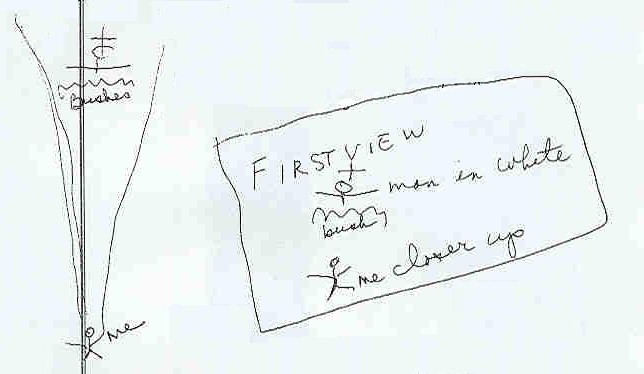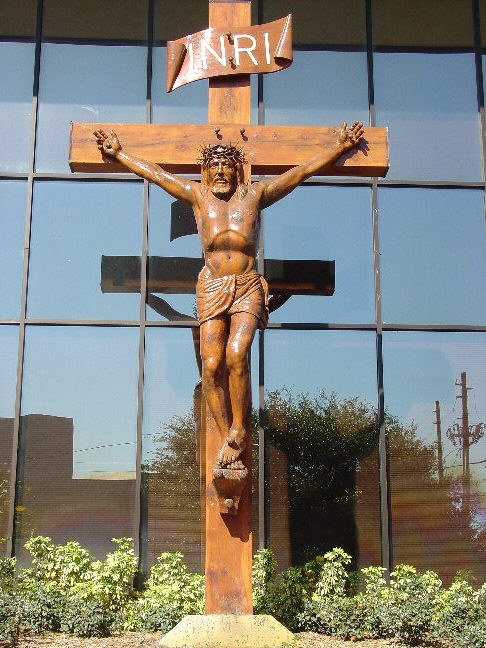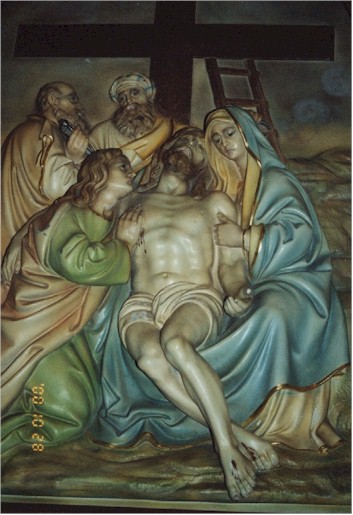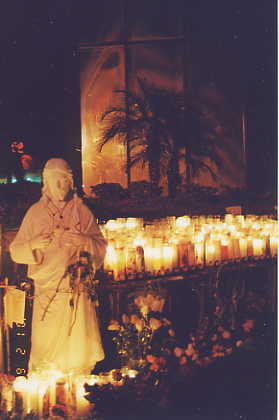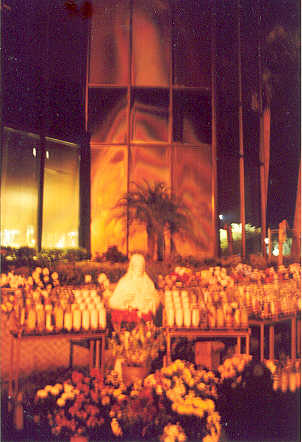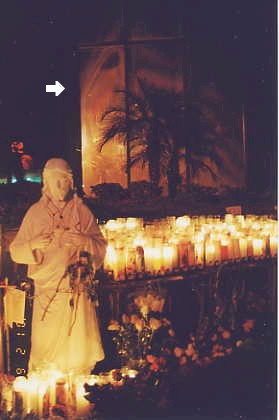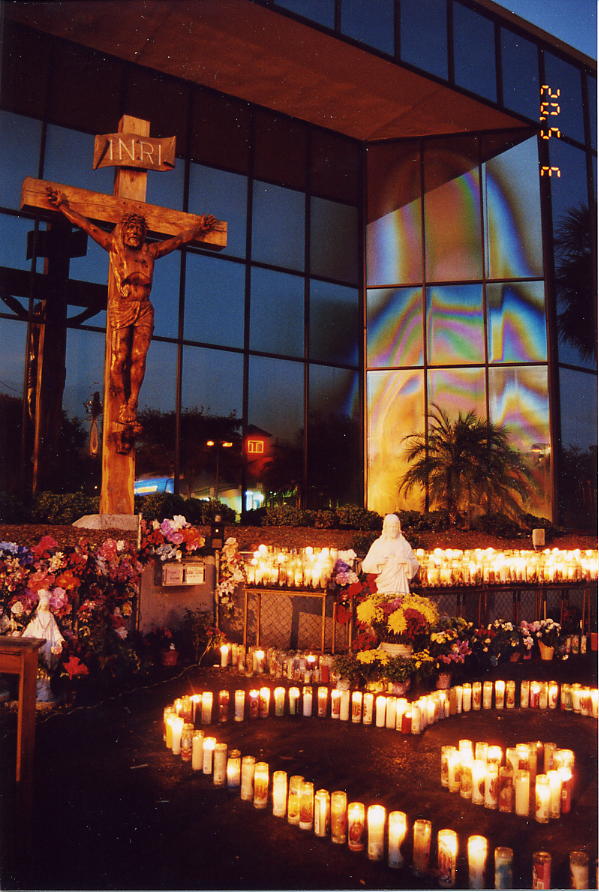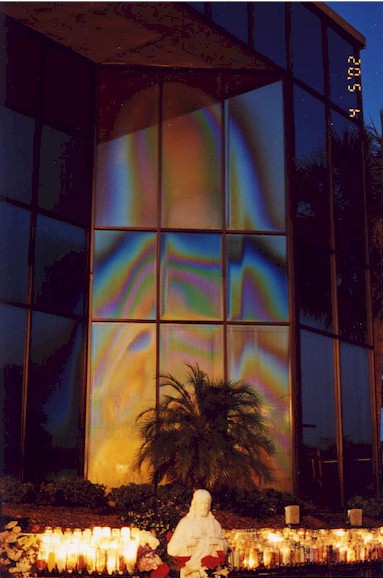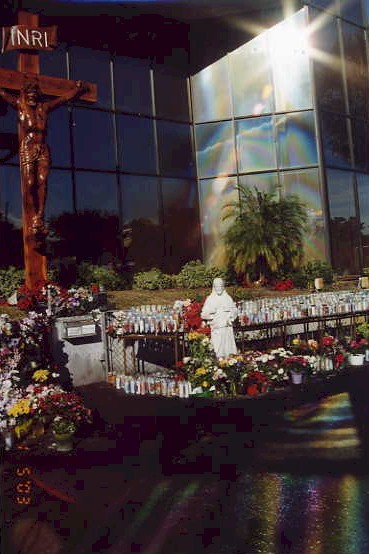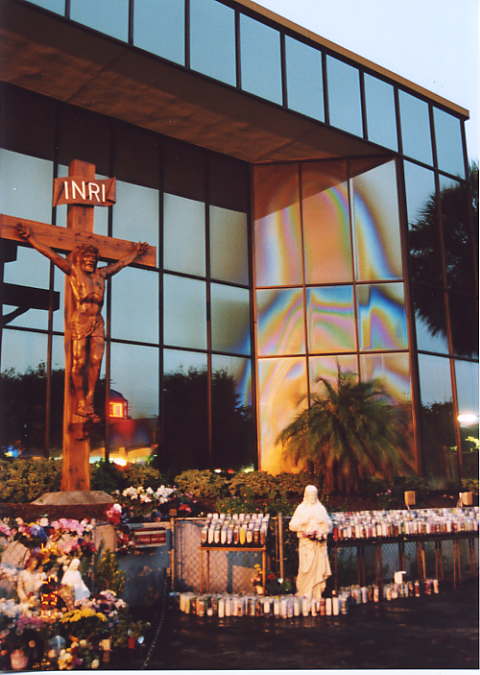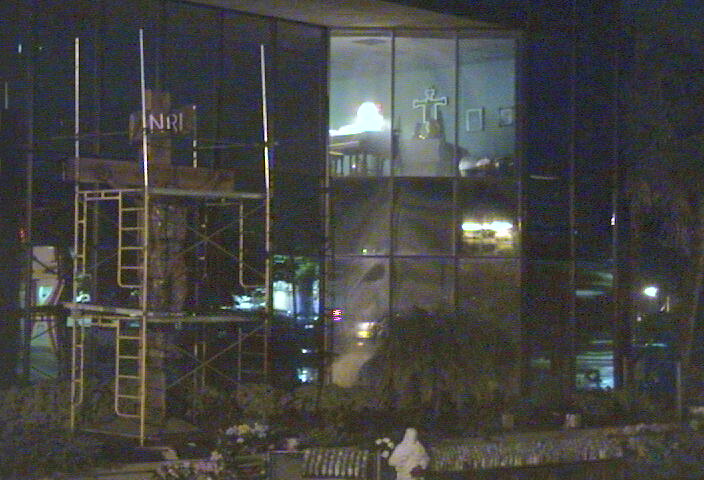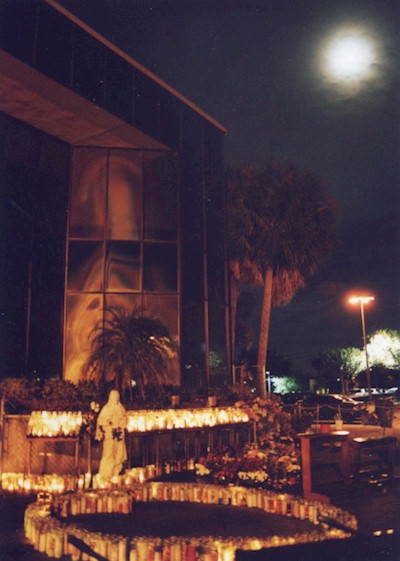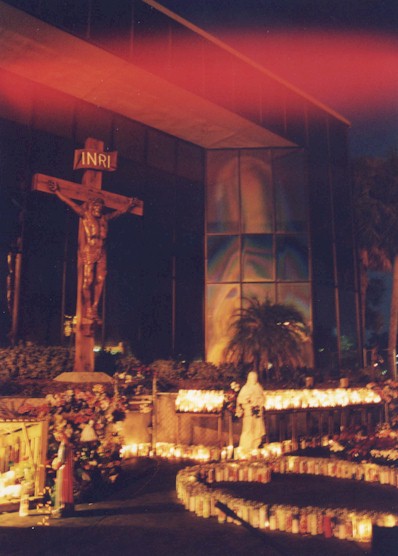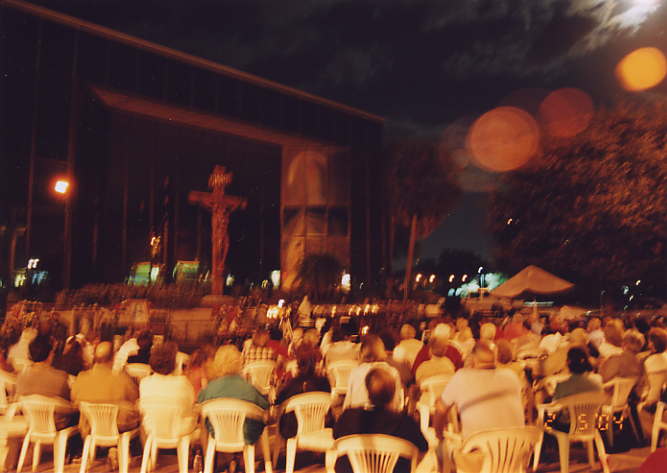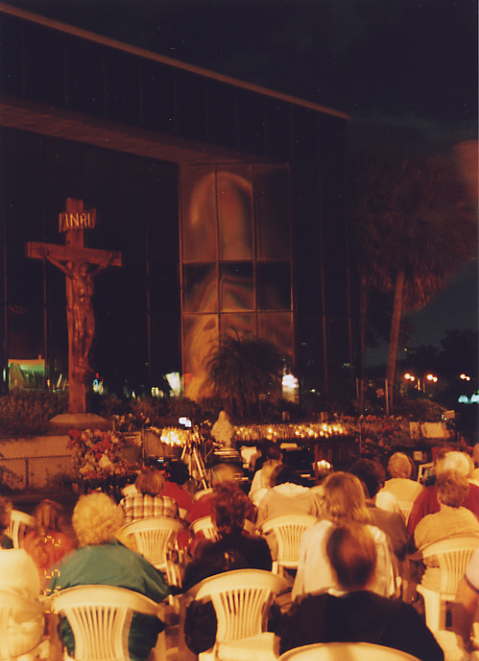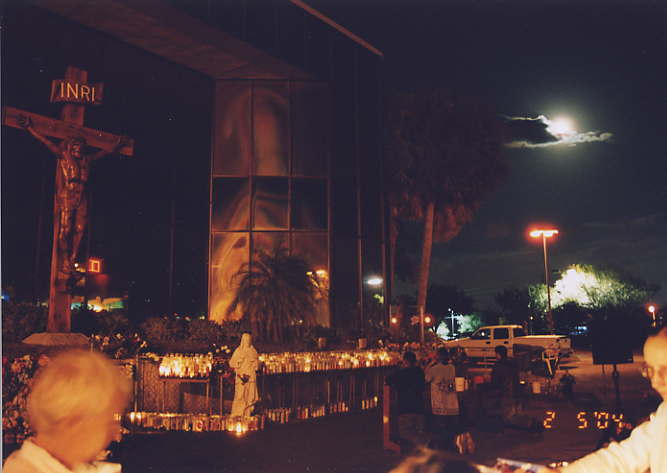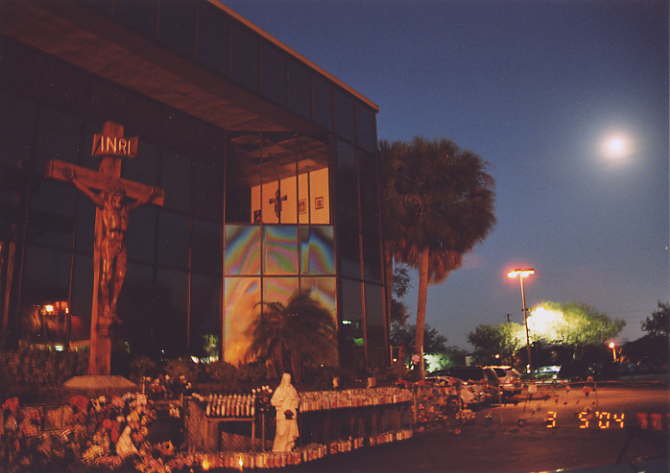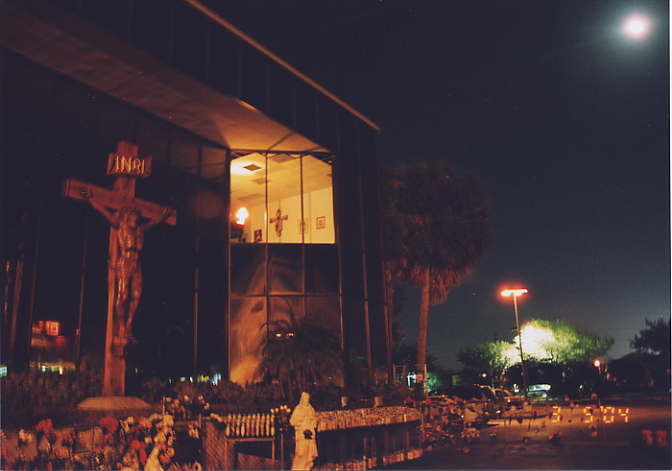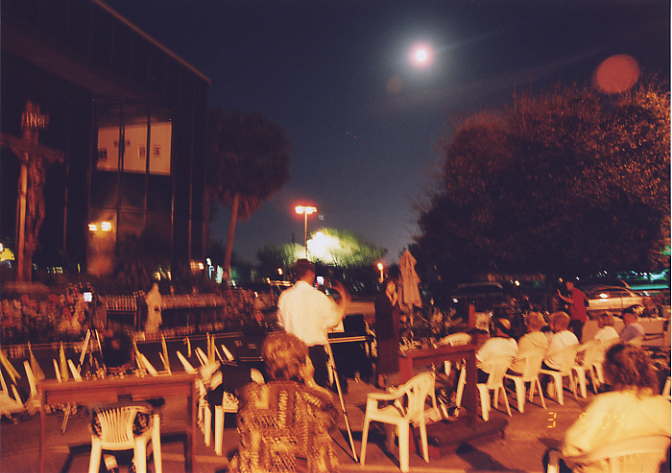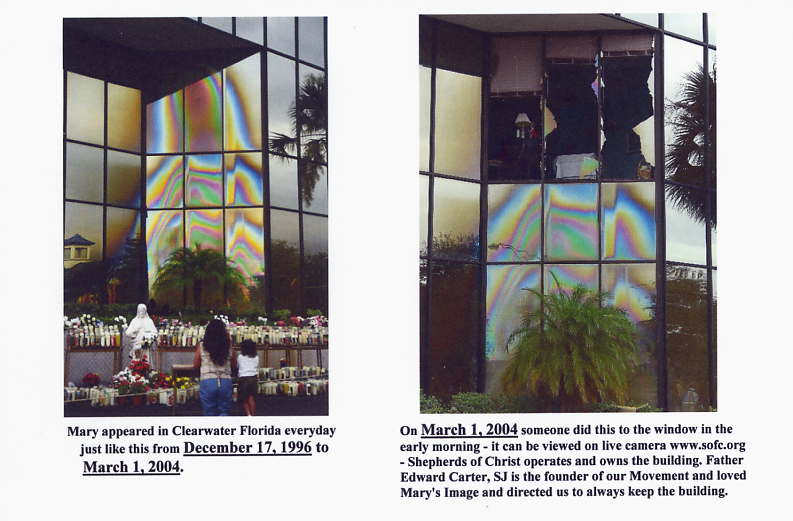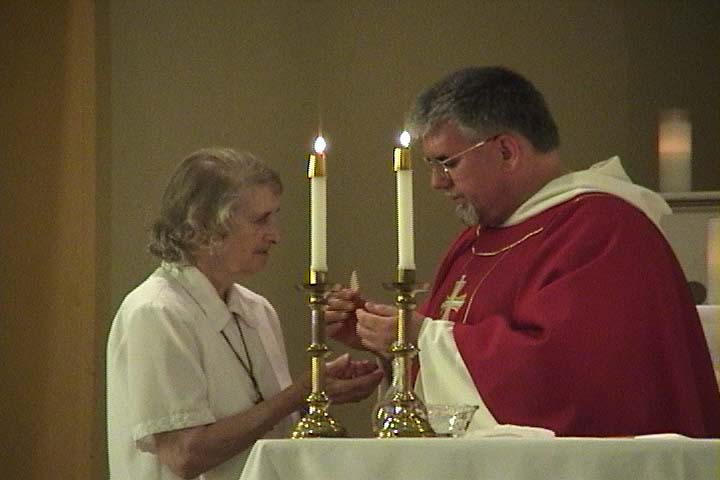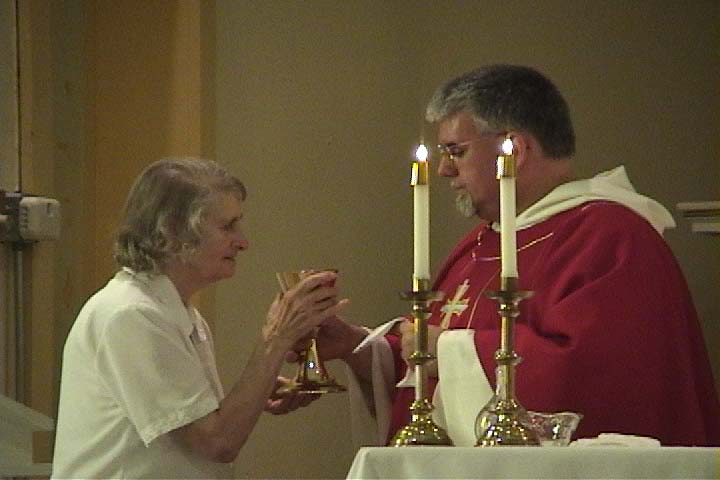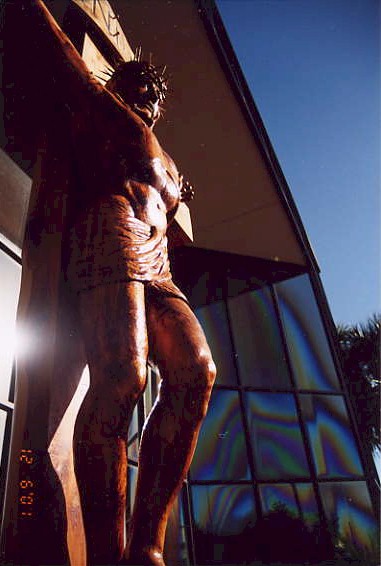"I am the good shepherd: the good shepherd is one who lays down his life for his sheep. The hired man, since he is not the shepherd and the sheep do not belong to him, abandons the sheep and runs away as soon as he sees a wolf coming, and then the wolf attacks and scatters the sheep; this is because he is only a hired man and has no concern for the sheep. I am the good shepherd; I know my own and my own know me, just as the Father knows me and I know the Father; and I lay down my life for my sheep." (Jn 10:11-151)
He hung upon a cross on a hill called Calvary. Death was near. How much Jesus had already suffered! He had been brutally scourged. Much of His sacred body was a bloody, open wound. He had been derisively crowned with thorns. In a terribly weakened condition, He carried the heavy cross to the hill of Golgotha. There He was stripped of His garments and mercilessly nailed to the cross.
Truly the Good Shepherd had laid down His life for His sheep. That magnificent Heart, overflowing with love for His Father and all of us, had beat its last.
Jesus' life was a life of love. He mightily loved His Father and all of us. The poverty, the hiddenness, the disappointments, the accomplishments, the weariness, the joy and the happiness, the pain and the agony-all that constituted the earthly life of the Incarnate Son of the Father, was experienced within the framework of love. Jesus, Who is divine and human, was the great man that He was as He walked this earth because He loved tremendously. He loved in everything He did-tenderly, manfully, with understanding and sympathy. He loved with complete devotedness and a deep concern for the individual. He loved with a passion for that which was true and beautiful and good. He loved with a complete conformity to the Father's Will. He loved always and completely. He loved with the gift of Himself, always pouring Himself out, even to the point of death. He gave Himself in love to His Father and to us until there was no more to give.This was the poignant beauty of Christ's life. He was a giant of greatness because He was one Who loved tremendously.
We can be tempted to reject this marvelous example of Christ. We can seek our greatness and fulfillment in a manner that necessarily results in disappointment. We can strive after greatness in ways that God does not intend. These wayward wanderings, however, result in a feeling of dissatisfaction and frustration. If we follow these false leads, we will eventually come to realize that they have betrayed us. Indeed, these wayward wanderings possess the potential for nothing but betrayal, because they are not rooted in Christ and His way of life-which is the way to true greatness.
We must incessantly remind ourselves of the example that Jesus has given us. We must deepen our realization that our fundamental greatness consists in what we are, and we are to the extent we love God and others. St. Paul, in his own inimitable way, tells us of this: "If I had all the eloquence of men or of angels, but speak without love, I am simply a gong booming or a cymbal clashing. If I have the gift of prophecy, understanding all the mysteries there are, and knowing everything, and if I have faith in all its fullness, to move mountains, but without love, then I am nothing at all. If I give away all that I possess, piece by piece, and if I even let them take my body to burn it, but am without love, it will do me no good whatever." (1 Cor 13: 1-3)
Our greatness, then, lies in our relating in love to both God and others-yes, even to that vast majority whom we will never see or know directly, but whom our love can nevertheless reach out and touch because of our union with Christ. With Christ, there are no space barriers, and, therefore, uniting our love to His can unite us to people the world over.
We grow as Christians through a life that is centered in love within the milieu of the human condition. This is the only framework we have for achieving our greatness, our true personhood, and, consequently, we must not shirk the human condition. Jesus did not shirk it, but rather accepted it and manifested His greatness within it, despite the pain and agony that the human condition at times heaped upon Him. It is true that Jesus rejoiced during the course of His life because of the goodness, sincerity, and response of some of those with whom He dealt. The love that Mary and Joseph showered on Jesus, for instance, gave Him great joy. During His life, however, Jesus often suffered because of the evil side of others-their pettiness, cowardice, insensitivity, selfishness, egotism. In other words, Jesus suffered at the hands of others because they were not what they should have been. However, these experiences did not thwart the greatness of Jesus. He was always what He should have been. Jesus was always the tremendous lover, and He loved even at those times when it was very painful to do so.
Our own greatness in Christ, our growth as Christians, can develop smoothly and joyfully because we, in a special way, experience the goodness and love within the hearts of others, and this makes it easy for us to love as we should. Sometimes, however, the less wholesome side of others crowds in upon us, and we find it difficult to go on loving as we should. In the same way that Christ suffered because of others, we, too, as we try to love, suffer because of others. We suffer because others do not always understand us-this can be true even of those who dearly love us. We suffer because some do not appreciate what we do for them, and sometimes what we do exacts great personal cost. We suffer because others either reject us or make us the objects of their meanness and selfishness. We suffer because there are some who ignore us. At times we suffer so much that we are tempted to withdraw from the pain of giving ourselves in love into an egotistic enclosure of self-seeking, where, we think, we will no longer suffer at the hands of others, or at least will not suffer so much. To surrender to such a temptation, however, is to forget what Christian greatness really is, namely, a life of love for God and others, a love that does not shrink from the pain that results from loving in an imperfect world, a love that is meant to become greater and more selfless regardless of the way other might treat us. Love, then, accepts both the joy and the pain of life and carries on under both conditions. Yes, we are made for love.
The first letter of John tells us: "God is love and anyone who lives in love lives in God, and God lives in him. Love will come to its perfection in us when we can face the day of judgment without fear; because even in this world we have become as he is.
"In love there can be no fear, but fear is driven out by perfect love: because to fear is to expect punishment, and anyone who is afraid is still imperfect in love.
"We are to love, then, because he loved us first. Anyone who says, 'I love God,' and hates his brother, is a liar, since a man who does not love the brother that he can see, cannot love God, whom he has never seen.
"So this is the commandment that he has given us, that anyone who loves God must also love his brother." (1 Jn 4:16-21)
The more love matures, the more it concentrates on the present. Love welcomes each day with a fresh joy and a renewed gratitude to God for the opportunity to once again be and become for Him and others. Love realizes that it does not fully possess the past or the future-it can only fully grasp the present, and it loathes to waste any of the preciousness which "the now" offers.
Love is gentle, love is tender. Love is sensitive to the gentleness in nature. It is moved by the softness of the freshly fallen snow, the coolness of an autumn breeze tenderly stroking the brow, and the softness of the grass in May-time greenness. Much more important, love is sensitive to the need for gentleness, for tenderness, in human affairs. Consequently, love gently comforts the grief-stricken parents of a child so tragically and suddenly snatched away in death. Love gently encourages those to whom life seems hopeless. Love sensitively tends to the needs of those who are so often and so easily forgotten. Yes, the gentleness of love manifests itself in these and in many other ways, and, in so doing, imitates the gentleness, the tenderness of Jesus Himself: "Jerusalem, Jerusalem, you that kill the prophets and stone those who are sent to you! How often have I longed to gather your children, as a hen gathers her chicks under her wings, and you refused!" (Mat 23:37)
The fact that love is gentle does not mean that it is not strong. It is precisely this, and the blend between its tenderness and its strength constitutes one of love's most attractive traits. Love is strong in many ways. It is not discouraged by the evil in the world that threatens to thwart the accomplishments of love's goals. It realizes that the strength of goodness is mightier than the force of evil and that ultimately love wins out. Love is also strong in bearing with the temporary failures that are experienced in the pursuit of its purpose. Although love may be disappointed, it nevertheless realizes that the only failure it cannot conquer would be love's refusal-love's failure to go on loving-and true love will never quit. Love is strong in its willingness to take the necessary means to achieve its goals, even though this might entail great personal cost or cause misunderstanding, or even cause pain to those who are the recipients of this love.
Love is secure. A person who properly loves is in touch with one's true self and realizes that he or she is tremendously loved by God. Such a person feels secure in the exercise of love towards others. He or she feels secure enough to extend love towards others in various ways, even when little or no love is returned.
Closely allied to love's feeling secure is love's intuition in realizing the evils of possessiveness. Love does not try to possess the person one loves, but leaves the other free. In fact, authentic love for the other makes the other more free and helps the other to grow in all ways, including growth along the paths of real freedom. The one who loves authentically leaves the other free to grow in all sorts of ways, for example, to relate to other people and to undertake new things, activities which might well make the loved one less accessible.
Love is reconciliatory and integrative. Loves hates divisiveness. It knows the difference between diversity and divisiveness. It knows that healthy diversity reflects the varied richness of human existence and is something to be desired. It knows, too, that divisiveness is the sworn enemy of community. Divisiveness perniciously eats away at those bonds of love and union that are meant to unite the members of God's human family. Love, consequently, works to promote the integrative process which unites us and human events according to God's holistic plan, a plan in which the numerous and richly diversified parts become increasingly beautiful the more they contribute to the health and functioning of the whole.
Love is trusting. Regarding a person's relationship with God, this attitude grows in proportion to the atmosphere of love. As one grows in the realization of how much God loves him or her, and responds with a love of his or her own, trust in God matures and is a dominant facet of one's daily existence. A serenity of spirit becomes more obvious as the person grows in the awareness of both how much God cares and how supportive His loving embrace is, come what may.
This attitude of trust also characterizes one's relationships with others. One who is exercising true love is not naive or oblivious to the fact that one can be needlessly hurt by this: that one's trust can be betrayed. On the contrary, one who loves realizes that there is certainly an evil side to human nature, but, nevertheless, prefers to concentrate on the basic goodness of the human heart. This positive focus allows a person to trust that people not only will frequently act according to this goodness, but, as a matter of fact, will actually be encouraged to do so when they themselves are the recipients of a true and sincere love.
Love is affirming. By the very fact that one loves another, the other is encouraged to be and to become according to his or her uniqueness. Being loved enhances a person's sense of worthwhileness. A person who is loved is encouraged to develop his or her uniqueness, to feel more at home with oneself, and to accomplish further the special mission in life that only he or she can fulfill.
Love is patient. Love realizes that, for the most part, the growth of God's kingdom occurs at a very gradual pace. Sometimes this growth process seems exceedingly slow, and a person is tempted to wonder if the efforts of love are actually producing any effects. Patience conquers this temptation, however, and enables love's work to continue. Patience consequently helps prevent the waste of talent in the work of the kingdom. It seems that certain talented people have never realized their potential in promoting Christ's cause precisely because they were not patient enough with others and themselves. Patience is a virtue that is not much discussed, but is nevertheless extremely necessary.
Love is not proud, is not egotistical. Love is interested, of course, in the self and the good of the self. One who loves authentically, however, realizes that the love of one's true self is based on the awareness that one has been created and redeemed by God's love, that one has been endowed with various gifts by the Creator, and that these gifts are to be exercised in the loving service of God and others. Love, then, does not become selfishly proud in its accomplishments. Rather, love realizes that God is the ultimate source of personal accomplishments, that one can achieve only what God helps a person to accomplish. Love is very much aware of Jesus' words that without Him we can do nothing.
Love is both universal and specific. Love is universal in that it excludes no one. For example, love includes all members of the human family in its prayer. Love is very much aware, however, that one can say he or she loves everybody, but be sadly lacking when it comes to manifesting love in various ways according to the concrete setting of every day. True love, then, does not shy away from the painful aspects of loving specific individuals in definite, concrete circumstances. Admittedly, such a service of love can be difficult, demanding, and unattractive in certain ways. Personality flaws in others, or particular personalities that are not attractive to the one who is trying to be of help, or indifference, or even hostility on the part of those one strives to serve-these and other realities are a true test of a person's willingness to concretely implement one's avowal that one does indeed love his or her neighbor as the Lord commands, even when it is difficult to do so.
The Christian's fundamental relationship is his or her union with God in Christ. The more one realizes how much God loves him or her as this unique individual, and the more the person responds to this love, the greater the happiness. If this basic love relationship with God in Christ is alive and healthy, everything else in life falls into place. There may be problems, at times very severe problems. There may be great suffering. But all of this becomes bearable for the one who feels reasonably secure in God's love. A poll has been taken which finds that unhappiness is about five times greater among non-religious people than among people who would be classified as being very religious.
The saints' progress in holiness was accompanied by their conviction that God loved them mightily. We also have to allow the realization of how much God loves us to accomplish our ongoing transformation in Christ. Since it's true that God loves each of us so uniquely, so intimately, why don't we take greater effort to arrive at the existential assent to this consoling truth? By an existential assent we mean one which reaches deep down, an assent which permeates our being so thoroughly that it erases and makes repugnant the thought of compromising for a life of spiritual mediocrity. At times we foolishly shy away from God's love. We foolishly think that to give ourselves ever more to this love, to allow it to possess us more radically, will mean that our lives will be too much hemmed in, too much cut off from the pursuit of our self-designed ideas of happiness. If we succumb to such a temptation, we become similar to the prodigal son who thought happiness existed elsewhere than in his father's house. His pursuit of this false happiness ultimately ended up in his willingness to eat the food given to pigs. We ourselves are not totally blameless. To the extent we refuse to be more possessed by God's love, and choose to be directed by it, to that degree we also are willing to settle for food which is unworthy, food which can never satisfy our true cravings.
Love is contemplative. It realizes it must sustain and develop a contemplative awareness of reality if it is to love properly. To relate in love to reality as we should means that first we must view reality according to its true nature, that is, we must see things according to our faith vision. Jesus has left us with the proper view of God and creation. Jesus has told us how to relate to God and His creation, how to love. This faith vision must be consistently actualized through a contemplative or prayerful awareness of the people, events, and circumstances that are part of our daily lives. If we fail, for example, to see people as they really are in their core existence, namely, as created and redeemed by God's love, and instead allow ourselves to be absorbed by more superficial aspects of their persons, then we will not love them as we should.
Love seeks, therefore, a certain degree of solitude in order to nourish this contemplative attitude. A person cannot hope to exercise a contemplative awareness throughout the myriad and often complex happenings of daily existence unless there are periods of withdrawal during which one can drink more deeply of the wisdom which contemplation offers. A person must conquer the temptation that deceitfully suggests that the seeking of solitude is a selfish desire to flee the pain of human encounter. Authentic solitude is never selfish; rather, it is a renewed opportunity for refurbishing both one's contemplative vision and one's determination to love more maturely according to this perspective.
Love knows what love really is, and this awareness is a result of love's contemplative thrust. One of the truths that emanates from the act of contemplation is the realization of what actually constitutes true love. This is no small accomplishment, for, despite the numberless volumes that have been written about love, one can still have only a blurred idea of what it really is. Giving love is the gift of self to promote the authentic good of the other loved. Being loved is receiving the other's gift of self as a help in achieving one's real good.
The manner in which the gift of self is made is commensurate with the type of relationship. A doctor gives himself or herself to one's spouse in one way, to one's children in another, to one's patients in yet another way, and to his or her friends in a way that is still further differentiated. Whatever way the gift of self is made, however, it has the same basic goal in mind, namely, to promote the real good of the other. Love realizes that it is not always easy to discern what really promotes the true good of the other. However, despite this difficulty, love is aware of its true identity. Love, in short, knows what love really is.
When we experience love-hurt in abundant measure, we can be tempted to think that it may be better not to love at all. But a moment's mature reflection tells us otherwise. We are made for love. We are to love God and human persons. The only way we can grow is to love. Despite the pain, we have to love if we want to grow, if we want to be happy, if we want to be what God destines us to be. At times, and especially when the love-pain is particularly keen, we should look at the example Jesus has left us. He came upon the earth to love. He did not flinch, He did not renege. He did not quit loving when it was painful to do so-even when it became agonizingly painful to do so. This is the poignant beauty of His life.
"After saying this, what can we add? With God on our side who can be against us? Since God did not spare His own Son, but gave Him up to benefit us all, we may be certain, after such a gift, that He will not refuse anything He can give. Could anyone accuse those that God has chosen? When God acquits, could anyone condemn? Could Christ Jesus? No! He not only died for us-He rose from the dead, and there at God's right hand He stands and pleads for us.
"Nothing therefore can come between us and the love of Christ, even if we are troubled or worried, or being persecuted, or lacking food or clothes, or being threatened or even attacked'
"For I am certain of this: neither death nor life, no angel, no prince, nothing that exists, nothing still to come, not any power, or height or depth, nor any created thing, can ever come between us and the love of God made visible in Christ Jesus Our Lord." (Rom 8:31-39)
From the spiritual classic, The Imitation of Christ, we read: "Make room for Christ. When you possess Christ you are a rich man, for he is sufficient for you. He himself shall provide for you and faithfully administer all your cares. You will not have to place your hope in man. Put all your trust in God, let him be both your fear and your love. He will respond on your behalf and will do whatever is in your best interest.
"You have here no lasting city. For wherever you find yourself, you will always be a pilgrim from another city. Until you are united intimately with Christ, you will never find your true rest.
"Let your thoughts be with the Most High and direct your prayers continually to Christ. If you do not know how to contemplate the glory of heaven, take comfort in the passion of Christ, and dwell willingly in his sacred wounds. Endure with Christ, suffer for him, if you wish to reign with him.
"Once you have entered completely into the depths of Jesus, and have a taste of powerful love, then you will not care about your own convenience or inconvenience. Rather, you will rejoice all the more in insults and injuries, for the love of Jesus makes a man scorn his own needs."2
Fr. Paul de Jaeger, S.J., writes: "Why do we not once and for all spread wide the sails of the ship of our trust? Did we but do this, how utterly our lives would be changed! How this would enable us to ride before the wind, to ride fast towards the greatly desired anchorage of perfect union with Jesus! Only when she had made strong her trust did St. Teresa of the Child Jesus, trust's great Saint, set out to walk the ways of divine love. From that day on her life was changed. Is that not our need also? Would that for us too this change could be made without delay, could be made this very day! Would that, making a supreme effort to respond to the full to the infinite goodness of Jesus in the Eucharist, we could bid a final farewell to all our cowardice, to all our vain fears, to all things conducive of faulty trust'"3
Fr. Peter van Breeman, S.J., observes: "The matter of joy in the risen Lord has a great deal to do with faith, for a sad Christian is really not an authentic Christian. In this regard the words of Mother Teresa of Calcutta are impressive. She has devoted her life to the lowest form of human misery; her days are wholly taken up with the sufferings and the sorrows of the most forsaken. And, yet, her words are unqualified: 'Never let anything fill your heart with so much grief that you forget the joys of the risen Lord.' These are the words of a woman of faith'Mother Teresa can work with the poor because she has Christ's own intense joy and gladness in her heart. It is this which makes her so radiant, so appealing. For this reason people flock to her, and she is able to console them truly, not just with money or medication-she has too little of these-but above all with the true consolation that comes from faith, the faith embodied in her own life."4
- Scriptural quotations are taken from The Jerusalem Bible, Doubleday & Co.
- "The Imitation of Christ," as in The Liturgy of the Hours, Catholic Book Publishing Company, Volume II, pp. 527-528.
- Fr. Paul de Jaeger, S.J., The Virtue of Trust, P.J. Kenedy & Sons, p. 59.
- Fr. Peter van Breeman, S.J., Called By Name, Dimension Books, pp. 201-202.

